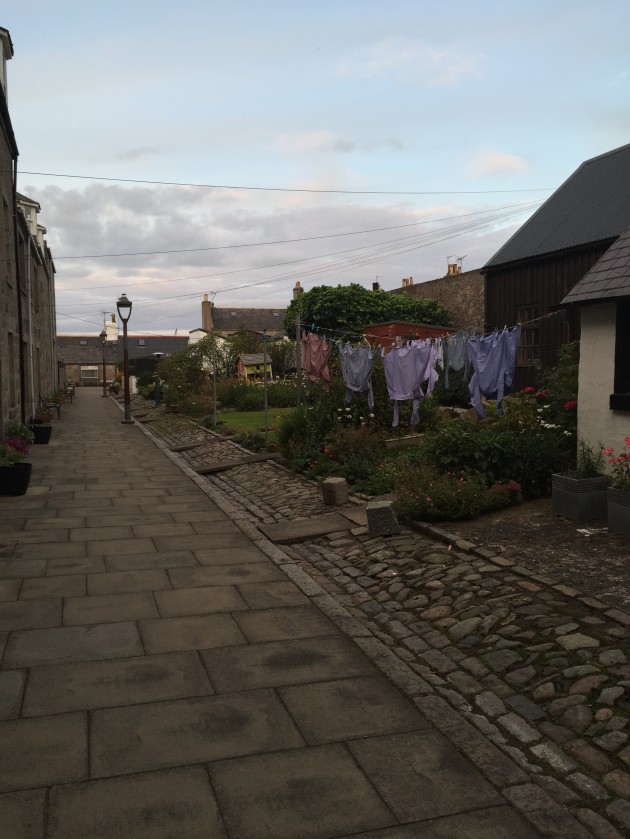
by Tallen Sloane
How Aberdeen Shaped My Jewish Feminism

Footdee, a small fishing village in Aberdeen City. Photo credit: Tallen Sloane.
I met Miriam* at Purim after the reading of the Megillah in Aberdeen, where festivities were in full swing amongst the small Jewish community in North-East Scotland. Months later, Miriam and I met again while I was conducting a series of oral history interviews as part of my work for a master’s program in folklore that brought me from the US to Scotland. My project sought to document—and celebrate—the diversity of Jewish religious expression in Aberdeenshire.
The process of conducting ethnographic research in the Jewish community in Scotland was emotional and transformative for me, as Jew and as a feminist. My contributors discussed their personal journeys towards accepting Judaism on their own terms and said that this occurred, in the poignant words of one woman, because of “the miracle that is the Aberdeen community.” Because it is small and relatively dispersed, the Jewish community in the North-East of Scotland offers space for women to explore their faith free from the teachings of the male hegemonic leadership that often dictates the definition of Judaism and Jewish identity.
Here is an edited version of my 90-minute conversation with Miriam.
Miriam’s account of her relocation to Aberdeen from London brings both uncomfortable truths and astute witticisms. She’s a quick woman, both in speech and thought, and “is not very good at compromise.” Miriam’s Judaism evolved from active participation in Modern Orthodoxy in London to an embrace of Jewish feminism in Aberdeen that emerged as she began to question the routines of her former community. “If it’s just me I can cope with all the hypocrisy and I can just shove it under the carpet and ignore it,” she says. But then, she had a daughter.
I did not feel comfortable about telling my daughter that she was a wonderful person who was the equal of every brother and every other male in the world, and she could do anything she wanted at school, and she could do anything she wanted at college, and she could do any job in the world, and she could be prime minister, and she could be president, and she could be anything she wanted to be, but she can’t stand up in synagogue and have an aliyah. I’m sorry, I just couldn’t do it. I just could not treat her like a second-class citizen.
Miriam’s feminist metamorphosis was spurred by her uncompromising drive to raise a daughter who feels valued for who she is in her community, despite what custom may dictate as gender appropriate. This was epitomized when Miriam designed an empowering bat mitzvah for her daughter by “merely allowing the rules to be applied rather than following the custom.”
So, what happened was [my daughter] leyned [read from the Torah] at the beginning, and then the man who had come up to help us went back to the beginning and leyned the whole thing, so technically we fulfilled our obligation, Orthodoxly. But she also got to leyn. Now, we did nothing wrong, but you could not have done that in London.
Sharing her feminism with her daughter and questioning Modern Orthodox tradition, Miriam engaged in the creative and difficult process of reconciling Jewish and feminist identities, but she did even more than that. She took one step further on her unique spiritual path. She became willing to shift her practice to align with the lessons she’d learned through her life.
Big faiths aren’t about personal journeys; they’re much more about community. There’s not to say that you don’t have the individual journeys within that group, Judaism is very good at saying: “Yes of course, ask any questions you like. You know, we are here to answer any questions.” But, at the end of the day, it’s certainly within the Orthodox community, within the Modern Orthodox community; they sort of want you to hold a line.
Our communities can shape our experience by asking us to conform or compromise. As Miriam discovered when she moved the 545 miles north to Aberdeen, in her mid-forties, blindly jumping into a new experience can be profoundly life altering. As she says, “for some people jumping off a cliff is not something they want to do” because they do not believe that “there’s going to be a trampoline to catch [them] at the bottom.” Clearly, she jumped and allowed her faith to catch her. Miriam’s spiritual journey of Jewish and feminist reconciliation has been one of trust and trampolines.
Even though her story is just one of millions of women’s narratives of personal liberation, her account reveals the diversity of Jewish feminist experience that I found personally meaningful. She discussed the difficult decisions we make to synthesize our Jewish and feminist values and highlighted the moments that directly relate to those hard choices.
Although I have yet to fully reconcile the my own craving for divine feminine with the Jewish traditions in my community, listening to other women’s stories has moved me to delve below the binaries that shape the superficial interpretations of halacha, Jewish law. I have discovered joy in interpreting Jewish tradition through the lens of the metaphorical. These women taught me that within each of us we have the capacity to access love so deep and so strong that it defies tradition for tradition’s sake.
*Miriam is a pseudonym chosen by the interviewee.
The views and opinions expressed in this article are the author’s own and do not necessarily reflect those of Lilith Magazine.